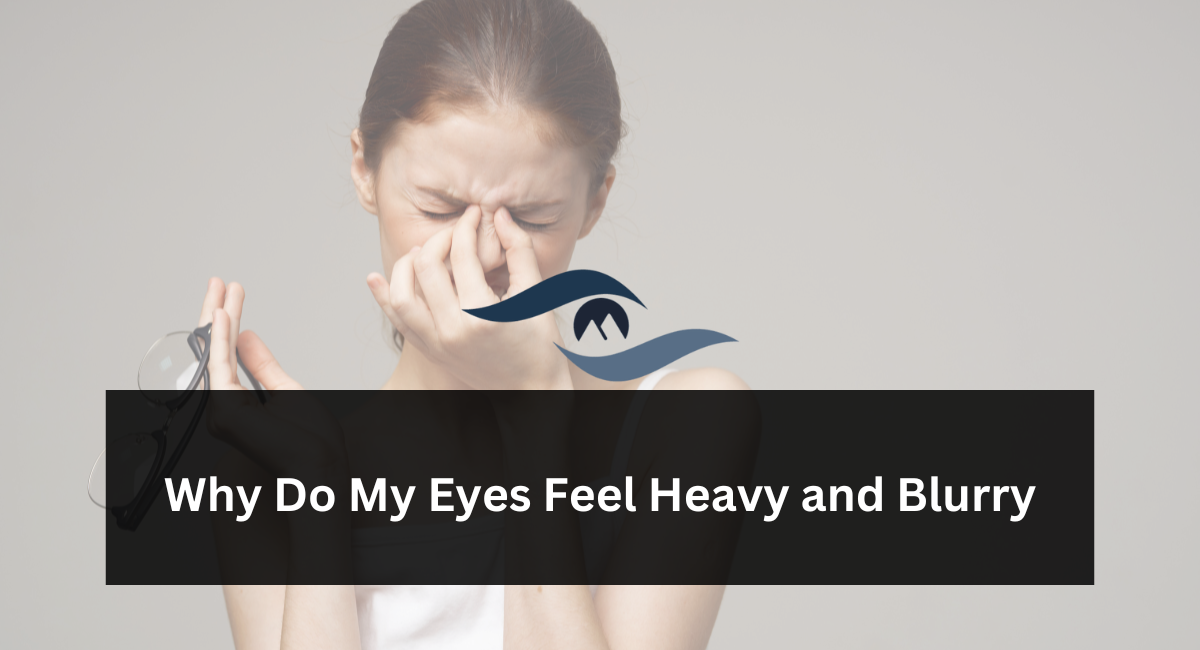Have you ever felt a sensation of heaviness and blurriness in your eyes that persists? It may be bothersome and unpleasant, but comprehending the reasons behind it might assist you in finding alleviation.
In this blog post, we will examine the typical reasons for experiencing heavy and foggy eyes using straightforward language, as well as provide effective remedies to reduce discomfort and enhance your eye well-being.
Eye Exhaustion:
One of the most frequent causes of tired and blurry eyes is eye fatigue. When you spend extended periods of time looking at displays, reading, or doing chores up close, your eye muscles might get strained and fatigued.
This can result in symptoms like weightiness, haziness, and trouble concentrating.
Solution:
Take a rest for your eyes! Adhere to the 20-20-20 guideline: every 20 minutes, pause for 20 seconds to focus on an object 20 feet in the distance.
This aids in the relaxation of your eye muscles and the reduction of weariness. Moreover, ensure that you blink frequently to maintain the lubrication and hydration of your eyes.
Dry Eye Syndrome:
Dry eye syndrome happens when your eyes don’t make enough tears or when the quality of your tears is not good. This can lead to symptoms like weightiness, haziness, itching, and redness.
Solution:
Utilize artificial tears or lubricating eye drops to maintain moisture and comfort in your eyes.
You can also consider using a humidifier in your home or office to increase the moisture in the air and prevent your eyes from becoming dry.
Allergies:
Allergies can sometimes cause significant and unclear vision, particularly during allergy season.
Pollen, dust, cat dander, and other substances that cause allergies can cause discomfort in your eyes, resulting in symptoms including itching, watering, redness, and a feeling of heaviness.
Solution:
To minimize the risk of allergic responses, it is advisable to steer clear of allergens wherever feasible.
You can also utilize non-prescription antihistamine eye drops to alleviate discomfort and decrease inflammation. If your allergies are serious, think about seeing an allergist for further treatment choices.
Eye Infections:
Eye infections, such conjunctivitis (pink eye) or blepharitis (inflammation of the eyelids), can lead to a feeling of heaviness, blurriness, and other unpleasant symptoms. Infections are commonly accompanied with redness, discharge, and sensitivity to light.
Solution:
If you think you might have an eye infection, it’s important to visit an eye doctor to get a correct diagnosis and treatment.
Based on the kind and seriousness of the illness, you might require antibiotics, antiviral drugs, or other therapies to eliminate the infection and relieve symptoms.
Refractive Issues:
Refractive issues, such myopia, hyperopia, or astigmatism, can also lead to tired and foggy eyes. If your eyes struggle to correctly focus light onto the retina, it can result in blurry vision and eye fatigue.
Solution:
If you experience refractive errors, using prescription eyeglasses or contact lenses can assist in correcting your eyesight and alleviating feelings of eye fatigue.
Make careful to schedule regular eye exams to keep track of any changes in your eyesight and alter your prescription as necessary.
Computer Vision Syndrome:
Due to the growing use of digital gadgets in our everyday routines, numerous individuals encounter symptoms of digital eye strain, sometimes referred to as computer vision syndrome.
Looking at screens for long durations can result in tiredness, dryness, and blurred vision, which can cause a sensation of heaviness and blurriness in the eyes.
Solution:
To decrease digital eye strain, adhere to the 20-20-20 guideline described previously and modify the brightness and contrast settings on your devices to enhance comfort for your eyes.
Think about utilizing glasses that block blue light or screen filters to reduce the negative impact of blue light from digital gadgets.
Medication Adverse Effects:
Some drugs can have adverse effects on the eyes, resulting in symptoms like blurry vision, dryness, and a feeling of heaviness.
Some medications, such as those that alter blood pressure, antihistamines, antidepressants, and oral contraceptives, can have an impact on eye health.
Solution:
If you have concerns that your medicine is producing symptoms connected to your eyes, seek advice from your healthcare practitioner.
They could modify your dosage or suggest alternate medications that have less impact on your eyes.
Tiredness and Insufficient Sleep:
Inadequate sleep patterns and ongoing tiredness can lead to discomfort and a feeling of heaviness in the eyes. When you’re fatigued, your eye muscles may not work as well, causing symptoms like blurry vision and eye fatigue.
Solution:
Make it a priority to get a sufficient quantity of sleep every night, usually around 7-9 hours for adults.
Develop a regular sleep schedule, establish a calming bedtime routine, and reduce screen time and other stimulating activities before going to bed to improve the quality of sleep.
Eye Fatigue from Inaccurate Prescription:
Wearing outdated or inaccurate prescription glasses or contact lenses can also result in eye fatigue, discomfort, and blurry vision.
If your prescription is outdated or does not adequately correct your vision, it might cause your eyes to exert more effort to focus, resulting in tiredness and a feeling of weightiness.
Solution:
Make sure to regularly schedule thorough eye exams with an eye care specialist to confirm that your prescription is up-to-date and suitable for your visual requirements.
If you have ongoing symptoms of eye strain or blurred vision, it might be a good idea to change your prescription.
Conclusion:
Tired and unfocused eyes can be irritating symptoms that affect your everyday life and productivity.
By recognizing the root reasons and applying straightforward remedies, like resting, regulating screen time, following excellent sleep habits, and maintaining correct eye care, you can reduce discomfort and enhance your eye health.
Make sure to pay attention to your body and consult with a specialist if you have ongoing or serious symptoms. It is important to give importance to your eye health in order to retain good vision and overall well-being.
